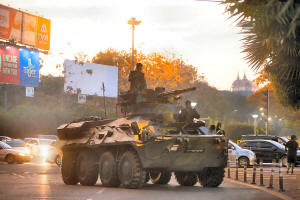Myanmar junta chief urges economic action as Western pressure grows
Source: Reuters
 Send a link to a friend
Send a link to a friend
 [February 23, 2021]
(Reuters) - The leader of Myanmar's
junta has called for energetic efforts to revive an ailing economy,
state media reported on Tuesday, as Western countries considered more
sanctions to press the generals to shun a violent crackdown on democracy
protests. [February 23, 2021]
(Reuters) - The leader of Myanmar's
junta has called for energetic efforts to revive an ailing economy,
state media reported on Tuesday, as Western countries considered more
sanctions to press the generals to shun a violent crackdown on democracy
protests.
The call for focus on the economy came after a general strike shut
businesses on Monday and huge crowds gathered to denounce the military's
Feb. 1 coup and demand the release of elected leader Aung San Suu Kyi,
despite a warning from authorities that confrontation could get people
killed.
The Group of 7 rich countries on Tuesday condemned intimidation and
oppression of those opposing the coup. "Anyone responding to peaceful
protests with violence must be held to account," group foreign ministers
said in a joint statement.
Protesters gathered again on Tuesday though in much smaller numbers.
There were also small marches in favour of the military, media reported.

There were no reports of violence.
Military chief General Min Aung Hlaing, in a meeting with his ruling
council on Monday, called for state spending and imports to be cut and
exports increased.
"The council needs to put its energy into reviving the country's ailing
economy. Economic remedy measures must be taken," state media quoted him
a saying.
The army seized power after alleging fraud in Nov. 8 elections,
detaining her and much of the party leadership. The electoral commission
dismissed the fraud complaints.
The crisis raises the prospect of isolation and investor jitters just as
the COVID-19 pandemic has undermined consumption and choked off tourism.
Min Aung Hlaing did not link the protests directly to economic problems
but said the authorities were following a democratic path in dealing
with them and police were using minimal force, such as rubber bullets,
state media reported.
The security forces have shown more restraint compared with earlier
crackdowns against people who had pushed for democracy during almost
half a century of direct military rule.
Even so, three protesters have been shot and killed. The army has said
one policeman died of injuries sustained during the protests.
The military has accused protesters of provoking violence but U.N.
Special Rapporteur Tom Andrews said the millions who marched on Monday
in a "breathtaking" turnout showed they were prepared to face up to
military threats.
"The generals are losing their power to intimidate and with it, their
power. It is past time for them to stand down, as the people of Myanmar
stand up," Andrews said on Twitter.
[to top of second column]
|

An armoured vehicle is seen on a street during a protest against the
military coup, in Yangon, Myanmar, February 14, 2021. Picture taken
February 14, 2021. REUTERS/Stringer

INDONESIAN PLAN
The European Union said it was considering sanctions that would
target businesses owned by the army, but the bloc ruled out any
curtailing its trade preferences to avoid hurting poor workers.
"We are not prepared to stand by and watch," German Foreign Minister
Heiko Maas said in Brussels on Monday.
Singapore's central bank said it had not found significant funds
from Myanmar in banks in Singapore but warned them to remain
vigilant to any transactions with companies and individuals subject
to sanctions.
The United States imposed sanctions on two more members of the junta
and warned it could take more action. It had already placed
sanctions on Myanmar's acting president, several military officers
and three companies in the jade and gems sector.
Britain, Germany and Japan have also condemned the violence and U.N.
Secretary-General Antonio Guterres urged the military to stop
repression.
Myanmar has in the past been unswayed by sanctions and denounced
what it called interference.
Giant neighbour China, which has traditionally taken a softer line
with Myanmar, said any international action should contribute to
Myanmar's stability, promote reconciliation and avoid complicating
the situation, media reported.
Indonesia was pushing Southeast Asian partners to support a plan to
keep the junta to its promise of holding new elections, with
monitors to ensure they are fair, sources familiar with the proposal
said.

But that would fall short of protester demands for the immediate
release of Suu Kyi and recognition of the November polls. Hundreds
gathered outside Indonesia's embassy in Yangon to voice their
opposition.
One protester put up a sign saying: "We don't need another
election!! Respect our votes."
On Tuesday, an Indonesian foreign ministry spokesman said a new
election was not Indonesia's position.
(Reporting by Reuters Staff; Writing by Ed Davies, Robert Birsel;
Editing by Stephen Coates and Simon Cameron-Moore)
[© 2021 Thomson Reuters. All rights
reserved.] Copyright 2021 Reuters. All rights reserved. This material may not be published,
broadcast, rewritten or redistributed.
Thompson Reuters is solely responsible for this content. |